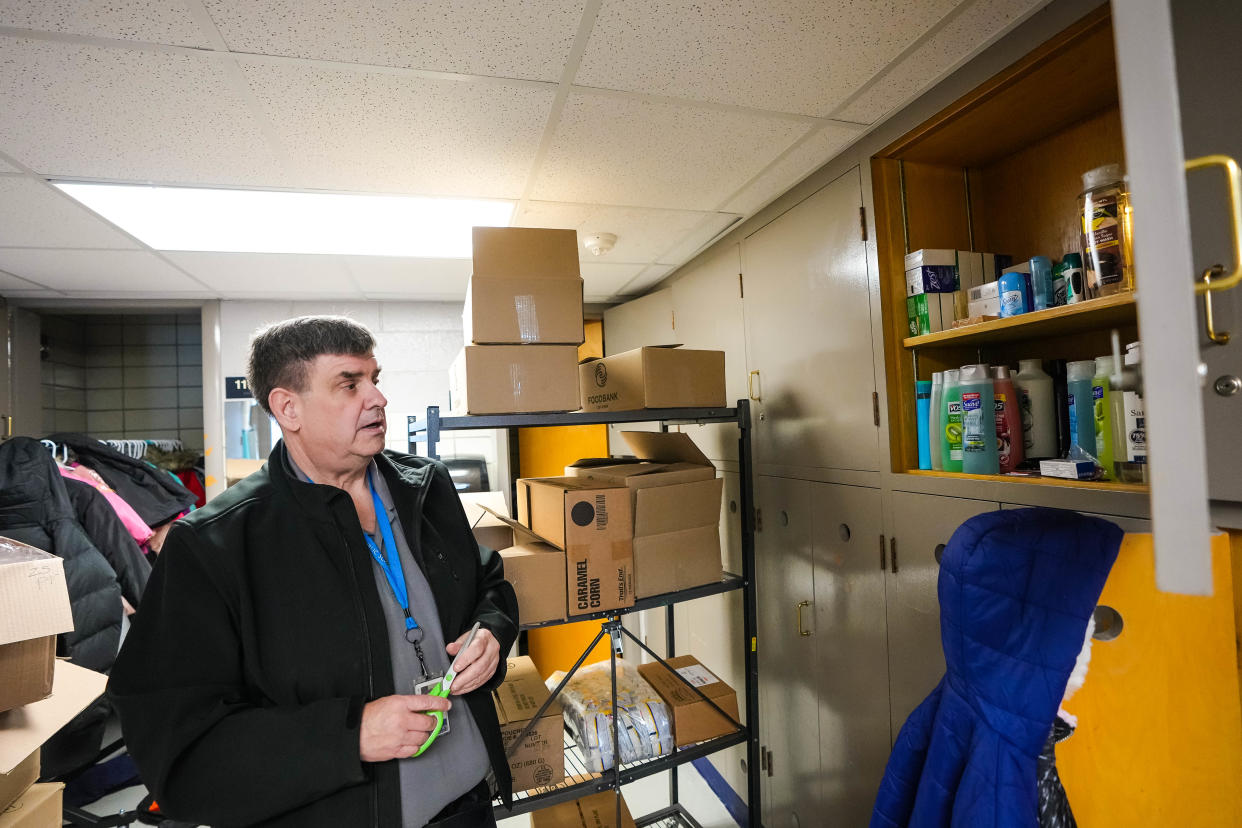More than 300,000 Iowans didn't have enough to eat in a week, report says

Charles Lee cruised down the aisles of Bidwell Riverside Center Pantry with a shopping cart, grabbing pre-cut fruits, a bagged salad kit, ground turkey, canned goods, bread and a small white sheet cake off the shelves.
Volunteer Charlene Brady followed closely behind him on Wednesday morning in Des Moines, guiding him through the stock and organizing the food in the cart to make room for a few personal and household items.
"Charlie did a little shopping today," Lee, 39, said smiling, as he and Webb headed for the door to load the box of groceries into his car.
Lee's excitement at bringing home food for his family shows the struggle thousands of people face in Iowa and across the nation with food insecurity.
A new report from Hunger Free America found that this year more than 25 million Americans didn't have enough to eat over a seven-day period. That's a nearly 30% jump from last year's roughly 20 million, and now food pantries and soup kitchens are working to meet a significant demand.
Though Iowa ranked among the states with the lowest food insecurity, the report noted that approximately 332,744 Iowans didn't have enough food to eat in a week in October 2022 — an 88% increase from October 2021's 177,233. Rising costs and pandemic-era funding cuts to programs like Supplemental Nutrition Assistance Program (SNAP), Child Tax Credit and school meals have severely impacted people's access to food, the report said.
"The federally funded increases in food and cash assistance were far greater than the increases in food prices, leaving the vast majority of Americans in far better condition than they would have been without this extra aid," the late December report from Hunger Free America, a research, policy and advocacy organization in New York focused on ending hunger, said.
More:Des Moines Public Library seeks to fill in hunger gaps with new community fridges
Making too much for aid but not enough to buy food
Missy Reams, a volunteer and community outreach manager at Bidwell, said she saw more and more clients coming to the pantry after the state lost an estimated $29.5 million in increased SNAP benefits in April and households lost the additional $95 per month, a figure that made a difference for those living paycheck to paycheck.
Those enhanced benefits were woven into a Gov. Kim Reynolds' coronavirus emergency proclamation, which ended in February.
"It's no wonder that, as this report demonstrates, hunger and food insecurity rates continue to soar in all 50 states, especially among working people, children and seniors," Hunger for America stated.
Remas said that Bidwell, which operates the largest food pantry in the Des Moines Area Religious Council network and has a no-boundary policy, typically saw about 4,000 clients a month. That number has risen to 5,000 — and counting — since last summer, she said.
More:Des Moines Public Schools sees number of homeless students rise before the holidays
Scott Caldwell, program director at Catholic Charities, said he and his staff have also seen an uptick in clients using the organization's food pantry in the last year. During the 2022 fiscal cycle, Caldwell said people visited the single-item food pantry 78,000 times. The 2023 fiscal cycle just began, and people have visited that pantry almost 39,000 times already.
"People really felt the impact" as inflation climbed and benefits dipped, and families who were already trying to stay afloat continued to struggle, Caldwell said.
Lee, a manager at a Burger King, said he makes "too much" money so isn't eligible for SNAP benefits but doesn't make nearly enough to keep up with his bills. In late December, Lee lost about 10 hours of work because a winter storm and the Christmas holiday forced the restaurant to close.
"Now, I'm down to 30 (hours)," Lee said. "It just went from sugar to s--, making $1,400 every two weeks to making $600 every two weeks."
Hunger Free America suggests that paying workers a living wage is one way to help minimize food insecurity. And if businesses don't voluntarily pay enough, then "the government should force them to do so," the nonprofit stated. "The government should also ensure a robust cash and food safety net when wages aren't enough."
Hunger Free America is also endorsing the federal HOPE Act, which was designed to offer people with lower incomes better access to benefits online and help them save money to buy their own homes, pay for college or develop retirement accounts. That proposal has not become law.
"The single best way to end hunger is to give more Americans the ability to develop assets to climb into — and stay in — the middle class," the nonprofit said.
How to find help
Hunger Free America provides a hotline of resources at 1-866-3-HUNGRY.
The nonprofit also has an online directory of resources at findfood.hungerfreeamerica.org.
The Food Bank of Iowa also lists state-based help at https://foodbankiowa.org/find-food/.
F. Amanda Tugade covers social justice issues for the Des Moines Register. Email her at ftugade@dmreg.com or follow her on Twitter @writefelissa.
This article originally appeared on Des Moines Register: 300,000+ Iowans didn't have enough to eat in a week, report says

